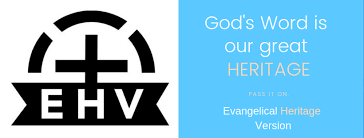I received a review copy of a new Bible translation: the Evangelical Heritage Version. It is the work of a group of scholars, pastors, and laypeople associated with the Wisconsin Evangelical Lutheran Synod (WELS) and the Evangelical Lutheran Synod (ELS) and is being published by Northwestern Publishing House.
The translators say that the EHV is not intended just as a “Lutheran Bible,” but that–like Luther’s pioneering translation which served as a model for the whole array of vernacular translations including the English versions of Tyndale and the King James Version–it is intended for all Christians.
Let me tell you about it, based on information from the website of the Wartburg Project, the organization responsible for the translation, and my own survey of the Bible.
Balanced and Flexible
I like the translation principles followed in the project. Instead of imposing a single policy to govern every translation decision, the translation aims at balance and flexibility.
The translation is eclectic when it comes to translation philosophies, sometimes using literal readings and sometimes using the dynamic equivalent approach (using phrases to fully capture certain meanings).
The EHV says that it uses gender-inclusive language when the original meaning is inclusive and exclusive when the original meaning refers to only one gender.
Instead of exclusively using either the relatively late but well-attested by the church Textus Receptus or the earliest but little-used manuscripts, the EHV draws on them both, including the “longer” readings (such as the long ending of Mark, the Woman Taken in Adultery in John) of the later manuscript tradition), while also taking advantage of earlier manuscript readings.
Since the Bible includes both formal and informal styles, the EHV adjusts its style accordingly. When the Bible talks about sex and “bodily functions,” it sometimes uses euphemism and sometimes uses “coarse” expressions, so the EHV follows suit.
The EHV retains theological words of the church, such as “justification,” but it sometimes offers new terms that better explain the meaning (such as “the Dwelling” instead of “the Tabernacle” and “Bread of the Presence” instead of “showbread.”
Faithful
The WELS and ELS denominations are highly committed to the inerrancy of Scripture, and this conviction is evident in the translation.
The EHV retains language that has become important to the Church in its creeds and liturgies. For example, it says that God “gave his only-begotten Son” instead of his “one and only Son” (NIV) or his “only Son” (ESV). “Only-begotten” is not only the time-honored reading of the KJV, but it ties into the Nicene Creed and preserves an important aspect of orthodox Christology. (See my discussion of that here.)
The EHV makes clear the Messianic prophecies of the Old Testament instead of obscuring them as some modern translations have done.
The EHV seeks to preserve figurative expressions when they are used in the original languages. (But not always the same figurative expressions. Its rendition of Genesis 4:1–accurately rendered in the KJV and ESV as “Adam knew Eve his wife; and she conceived” [KJV]–is “The man was intimate with Eve, his wife.” This is not just replacing a euphemism with a more commonly-known euphemism. “Know” as a metaphor for sexual relations carries a profound teaching about sex in God’s design. The metaphor–not just its meaning–is inspired language and should be retained.)
A Lutheran Bible?
Though the translators insist that the EHV is not just a “Lutheran Bible,” nor any sort of official translation of WELS or ELS, most Lutheran theological emphases are evident, as one would expect.
The translations of the relevant passages reflects a high view of the Sacraments of Baptism and the Lord’s Supper.
The distinction between Law and Gospel, the substitutionary atonement, justification by faith, and other teachings that characterize–but are not limited to–Lutherans are well-supported by this Bible. (See the ingenious way the EHV handles James 2:24, which seems to reverse Galatians 2:16 by saying that we are justified by works after all: “You see that a person is shown to be righteous by works and not by faith alone.” The EHV shifts from “justification” language to the related “righteousness” language.)
And yet, sometimes the “Lutheran” reading is surprisingly absent. What most translations render as “You must be born again” (John 3:7) can just as legitimately be rendered “You must be born from above.” Indeed, the Greek carries both meanings, as Nicodemus construes “anothen” as “again” and Jesus focuses on the other meaning. (See my discussion of this here.) Lutherans, being, like Calvinists, divine monergists believe that God creates faith through Word and Sacrament as a gift of the Holy Spirit. We are born “from above,” and this is the reading of the EHV.
And yet, in a closely-related passage in the same Gospel, the EHV accepts a non-monergist reading. The ESV rendering of John 1:12-13 is as follows:
12 But to all who did receive him, who believed in his name, he gave the right to become children of God, 13 who were born, not of blood nor of the will of the flesh nor of the will of man, but of God.
That verse 13, saying that the children of God are not born “of the will of man” is a pretty decisive refutation of “decision theology,” the notion common to many evangelicals –specifically, those of the Arminian persuasion–that we choose, by an act of our will, to be “born again.” But the EHV translates the phrase according to the Arminian interpretation: “or of a husband’s will.” As if the passage were referring only to physical sex and birth, and as if birth comes from the husband’s decision.
Also coming out not so strong as I would like are passages related to the doctrine of vocation, which, for Lutherans is an extremely important teaching, amounting to the theology of the Christian life. Here is a key passage for that teaching, an accurate rendition of 1 Corinthians 7:17 from the ESV: “Only let each person lead the life that the Lord has assigned to him, and to which God has called him.” Compare that to the EHV version: “However, each person is to live in the situation the Lord assigned to him—the situation he was in when God called him to faith.”
The context of the passage discusses marriage, being a Jew or a Gentile, being a “bondservant” or a free citizen. . . .These are not “situations” but vocations. The EHV reduces “calling” to the call to faith, completely eliminating the additional sense of the word that God calls us to the “life” that He has assigned us, where He has “stationed” us to live out our faith in love and service to our neighbor.
So, setting aside my disappointment in some of these readings, we can see that the reading that best serves Lutheran theology is not always the one chosen for the EHV, that the translators were trying to render what they believed the original languages meant apart from their theological preconceptions.
Conclusion
So the Evangelical Heritage Version is an interesting and helpful translation. I want to read more of it. I can see that, like other new translations, it can “defamiliarize” texts that I have become so used to that I have probably stopped reflecting on them as they deserve.
Lutherans will appreciate it, but so can non-Lutherans.
Whether we need more translations, whether there can be a problem when each theological tradition has its own favored Bible, and which is the best of the currently-available versions–those are separate questions that we might take up later.
The New Testament and Psalms in the EHV has been available for awhile and can be found on Biblegateway.com. The Kindle version is available from Amazon. But now the entire Bible, Old and New Testaments, has been released by Northwestern, the publishing arm of the Wisconsin Evangelical Lutheran Synod. As of this moment, it’s not on Amazon–though it probably soon will be–but it’s available through Northwestern.
If any of you have used this new translation or are familiar with the project, I’d love to hear from you here.
Illustration: EHV logo from Wartburg Project Facebook page














